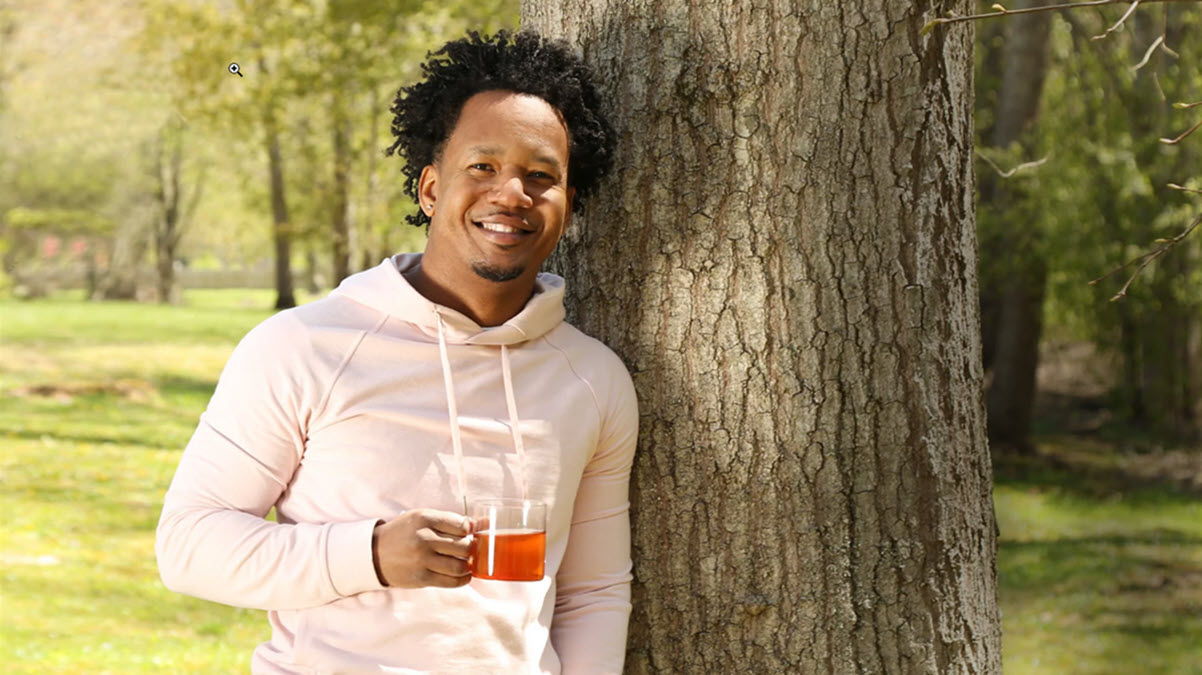Equitea co-founder Quentin Vennie discusses three new condition-specific canned, cold-brewed tea blends to ease anxiety and depression, improve focus, and calm young people coping with ADHD.
- Caption: Quentin Vennie, co-founder of Equitea, Baltimore, Maryland

Cold-Brewed Calm in a Can
Author and wellness expert Quentin Vennie, with his wife Erin, on the advice of their son’s neurologist, found that green tea helped their seven-year-old boy maintain calm and focus. Diagnosed with ADHD, a condition leading to impulsive, hyperactive behavior, tea’s unique combination of L-Theanine and Caffeine offered relief, but loose-leaf teas were challenging to brew and not that tasty to a pre-teen. Quentin and Erin added calming botanicals to make the tea palatable. Inspired by their success, they launched a tea venture that produced packaged teas that became a favorite of Gwyneth Paltrow, whose company goop sells the teas online.
Dan Bolton: I see that Equitea teas and botanicals are purpose blended. Will you tell listeners about your personal experience and how it led to their development?
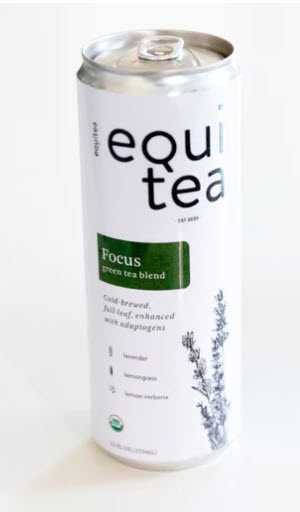
Quentin Vennie: We created Equitea essentially out of necessity. My son was diagnosed with ADHD (Attention-Deficit/Hyperactivity Disorder) when he was seven. Given my own history of dealing with mental health issues, generalized anxiety disorder, panic disorder, depression, and addiction to prescription pills, I wanted to manage his diagnosis holistically.
His neurologist recommended that he drink green tea before any big assignments or tests in school. The idea was that the L-theanine and the caffeine would give him a calm focus like Adderall would but without the risk of dependency or any negative side effects.
When my wife and I went out to buy different types of green tea, we found out quickly that many of the teas sold in retail stores weren’t of the best quality. They had minimal nutrition value, and they taste horrible, right? And so, we made the decision to make this work by learning as much as we could about green tea. The challenge was figuring out how to make it palatable for a nine-year-old struggling with ADHD. We wanted to ensure that every ingredient we blended with that green tea would assist him in that calm focus and not give him any ingredients that would make him hyper. So, we added things like lavender, lemon verbena, and lemongrass, things known to help with anxiety. Not only did it taste good, but it would serve the benefits we were looking for.
Later my wife and I made the decision to move forward by starting a tea company and creating our own blends to share, with every ingredient geared toward the desired result.
Dan: You recently added a line of canned tea using the cold brewing method. Will you talk about your reasoning?
We first launched as a loose-leaf company. Our consumers said that one of their biggest hurdles was that they didn’t have the necessary equipment and skills to brew it the way the blends were designed to be brewed. With cans, we take the guesswork out of it for many consumers. The process of cold brewing lets us extract a lot of the flavor while reducing the astringency that often accompanies green tea and some black teas that are astringent due to high water temperatures and long brew times.
We wanted to make sure that our tea delivered maximal flavor and maximal benefit and is a product that is shelf stable. One thing I learned while researching the cold brewing process is that it also helps reduce the amount of caffeine in each serving. Since the tea is marketed as safe for children, we wanted to keep the caffeine content to a minimum.*
See: Tea Benefits Children Onward from Age 4
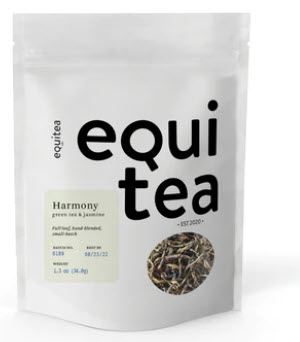
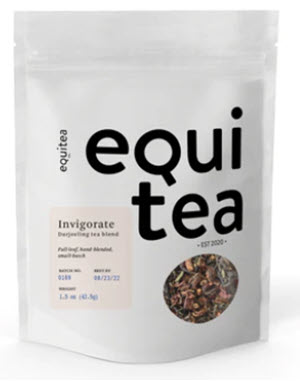
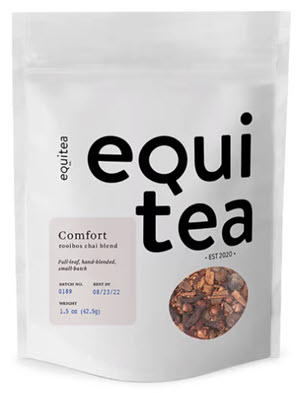
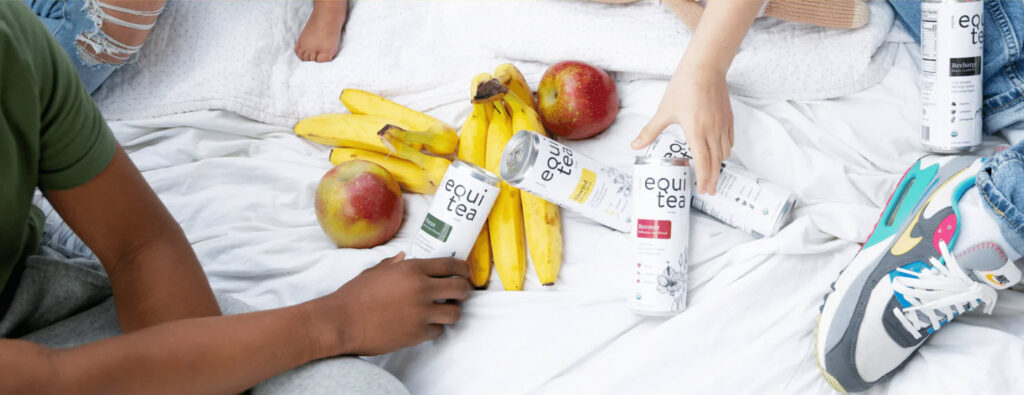
Dan: What is the milligram content for caffeine in a typical 12-ounce can?
Quentin: The green tea is about 18 milligrams, and the black tea is a little bit higher, closer to about 30 to 35 mg.
Dan: So that’s about half of what you would find in a regular cup of tea.
Quentin: Yes, exactly.
Dan: You use adaptogens. You mentioned them in three new blends. Will you describe which adaptogens are present and how they benefit tea drinkers?
Quentin: Absolutely. So, each tea has a different adaptogen. Our focus blend has Astragalus Root1, Our Recharge, black tea blend, has Ashwagandha2, and our Recover hibiscus blend, as Schisandra Berry3.
Adaptogens are geared toward helping the body and the mind to fight off stress and to recover better from stress. And, you know, we’re in a space of COVID uncertainty, and people are potentially moving into a recession. In prioritizing our mental health, it’s important to figure out how we can mitigate and reduce as much stress as possible.
Dan: In formulating the beverages, you chose all-natural, organic, full leaf teas and botanicals cold-brewed in small batches. Will you discuss sourcing?
Quentin: Sourcing is of the utmost importance to us, right? We’re communicating directly with small farms and farmers, you know, all across the world.
For us to create a USDA-certified organic product, every ingredient we use has to essentially fall under the same regulations as we do in America.
We wanted to make sure that everything was sustainable, sustainably sourced, non-GMO organic, and had the highest quality.
I often say that in America, tea hasn’t had its coffee moment yet. We don’t have a tea culture in America that has been, you know, stamped. And so a lot of the teas that I’ve had growing up are just very low quality, and just like any other crop that’s grown, right, if it’s not growing organically, there can be chemical compounds that are found in that crop that doesn’t necessarily serve the body. We firmly believe that everything we put into our bodies matters.
The challenge was figuring out how to make it palatable for a nine-year-old struggling with ADHD. We wanted to make sure that every ingredient that we blended with that green tea would assist him in that calm focus and not give him any ingredients that would make him hyper.
– Quentin Vennie
Dan: The 12-pack has a $47 suggested price, about $4 per can. Tell us about your strategy for bringing the brand to people.
Quentin: We just launched 100% online, through our website, direct-to-consumer. We are in talks with a few larger retailers and convenience stores. We plan to continue to grow and scale so that we can reduce the prices a little bit. We’re still a very small company, and it’s been a bit challenging with inflation. My goal is to grow this to be a national company. We really want to make wellness equitable and accessible.
Dan: Finally, tell us the story about how you came to the attention of goop Founder & CEO Gwyneth Paltrow.
Quentin: On social, we really connected with the work I was doing in the wellness space. She was a part of the initial ideation of the tea Company. She was one of the first people to try our blends, and she immediately fell in love with them. And, you know, our relationship just grew. She’s one of the most incredible human beings I’ve ever met.
And she’s been incredibly supportive throughout this entire process.
- *WebMD: Are there Health Benefits for Children Drinking Tea?
Astragalus Root1 - Ashwagandha2
- Schisandra Berry3
Link to share this post with your colleagues
Signup and receive Tea Biz weekly in your inbox.
